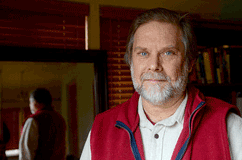Books by David R. Loy
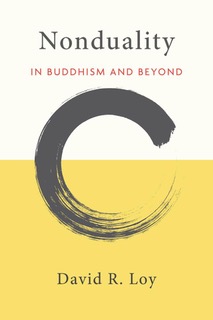
Nonduality: In Buddhism and Beyond (Somerville, MA: Wisdom Publications, 2019). Second Edition.
Focuses on the nonduality of subject and object in Buddhism, Vedanta, and Taoism, with reference to Western thinkers including Wittgenstein, Heidegger and William Blake. The main argument is that these three Asian systems may be understood as different attempts to describe the same experience. The categories of Buddhism (no self, impermanence, causality, eightfold path) and Advaita Vedanta (all-Self, time and causality as maya, no path) are “mirror images” of each other. Ultimately it becomes difficult to distinguish a formless Being (Brahman) from a formless nonbeing (shunyata). Buddhism seems to be a more phenomenological description of nonduality, Vedanta a more metaphysical account.
Listen to Jason Gregory's evaluation of the book.
Read more at Wisdom Publications.
Excerpt
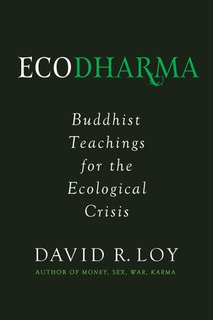
Ecodharma: Buddhist Teachings for the Ecological Crisis (Somerville, MA: Wisdom Publications, 2019).
This landmark work is simultaneously a manifesto, a blueprint, a call to action, and a deep comfort for troubling times. David R. Loy masterfully lays out the principles and perspectives of Ecodharma—a Buddhist response to our ecological predicament, introducing a new term for a new development of the Buddhist tradition.
Named "A Best Spiritual Book of the Year" by Spirituality & Practice
Now Available: Spanish Translation of Ecodharma through Ediciones La Llave
Ecodharma is also available in Korean, German and will soon be available in Italian and Portuguese.
Read more at Wisdom Publications.
Excerpt
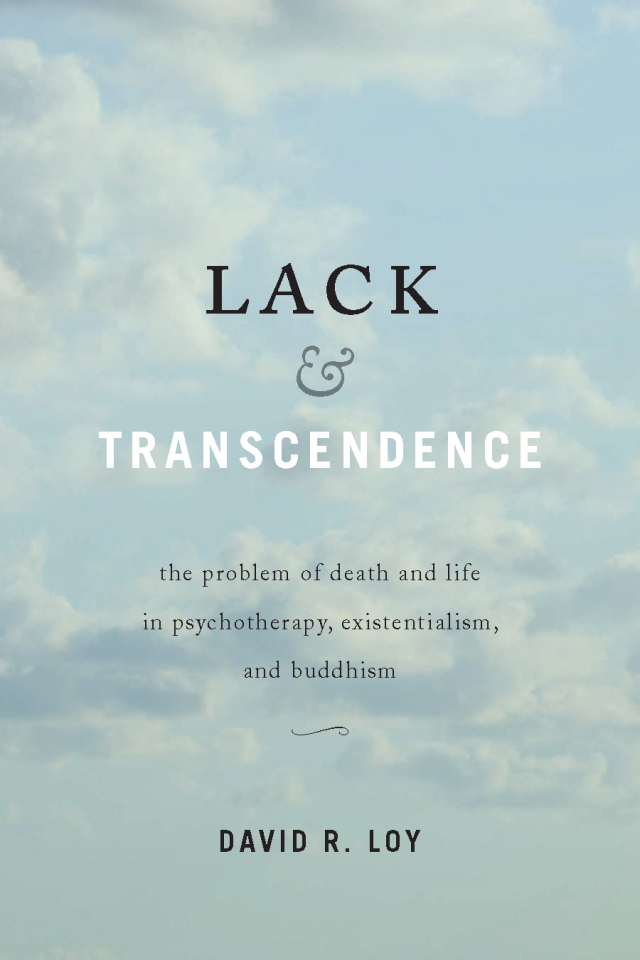
Lack and Transcendence: The Problem of Death and Life in Psychotherapy, Existentialism, and Buddhism (Somerville, MA: Wisdom Publications, 2018, second edition). Awarded the 1999 Frederick J. Streng Book Prize by the Society for Buddhist-Christian Studies, for best book of the year.
Brings the three traditions together in a synthesis receptive to the insights of each regarding the fundamental issues of life and death, and death-in-life. The Buddhist denial of a substantial self—in contemporary terms, that the sense of "self" is a psychological construct—implies that our basic fear is not death but nonbeing. In response, we become obsessed with “reality projects” (compare Becker’s “immortality projects”) that often make things worse.
Now Available: Spanish Translation of Lack and Transcendence
A Description & Why Read it from Shepherd: explore, discover, read
Excerpts
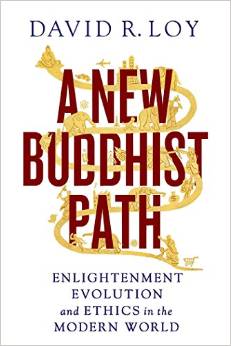
A New Buddhist Path: Enlightenment, Evolution, and Ethics in the Modern World (Wisdom Publications, 2015). Translated into German and Spanish.
David R. Loy addresses head-on the most pressing issues of Buddhist philosophy in our time. What is the meaning of enlightenment--is it an escape from the world, or is it a form of psychological healing? How can one reconcile modern scientific theory with ancient religious teachings? What is our role in the universe? Loy shows us that neither Buddhism nor secular society by itself is sufficient to answer these questions. Instead, he investigates the unexpected intersections of the two. Through this exchange, he uncovers a new Buddhist way, one that is faithful to the important traditions of Buddhism but compatible with modernity. This way, we can see the world as it is truly is, realize our indivisibility from it, and learn that the world's problems are our problems. This is a new path for a new world.
Here is a review by Daniel Liechty at the Ernest Becker Foundation.
Ruben Habito reviewed the book for Moutain Cloud Zen Center.
Read more at Wisdom Publications.
Excerpt

The World Is Made of Stories (Wisdom Publications, 2010).
A Spirituality & Practice "Best Spiritual Books of 2010" winner.
“Micro-essays” and quotations that offer a new way of understanding Buddhism and a new Buddhist understanding of the Way, consistent with what Buddhism says about the human predicament and how it can be resolved. If the self is composed of the stories one identifies with and attempts to live, karma is not what the self has but what the sense of self becomes, as we play habitual roles within stories perceived as objectively real.
Here are reviews from Tricycle and Spirituality & Practice.
Read more at Wisdom Publications.
Excerpt

Awareness Bound and Unbound: Buddhist Essays (SUNY Press, 2009).
A collection of related essays on Buddhist and comparative issues, including language, truth and deconstruction; Taoism, Christianity (Swedenborg, The Cloud of Unknowing), and postmodernism; the karma of women; violence, the clash of civilizations, and the war on terror.
Excerpt

A Buddhist Response to the Climate Emergency (Wisdom Publications, 2009). Co-edited with John Stanley and Gyurme Dorje.
The book includes contributions by the Dalai Lama, Thich Nhat Hanh, the Karmapa, Robert Aitken, Joanna Macy, Bhikkhu Bodhi, Joseph Goldstein, Matthieu Ricard, Lin Jensen, and many others.
Read more at Wisdom Publications.
Listen to Jason Gregory's evaluation of the book.
Excerpts

Money Sex War Karma: Notes for a Buddhist Revolution (Wisdom Publications, 2008). Translated into Spanish, Italian, French, Dutch, Thai, Korean, Estonian, and Japanese.
Short essays beginning with the essential teaching of the Buddha: the connection between suffering and the delusive (sense of) self, usually experienced as a sense of lack. Subsequent essays discuss the implications for the ways we understand money, fame, karma, food, sexuality and romantic love, consumerism, ecology, war, and social engagement.
Read more at Wisdom Publications.
Excerpts

The Dharma of Dragons and Daemons: Buddhist Themes in Modern Fantasy (Boston: Wisdom Publications, 2004). Co-authored with Linda Goodhew. Finalist for the 2006 Mythopoeic Scholarship Award in Myth and Fantasy Studies.
Considers the ways that spiritual themes (for example, good and evil, sin and redemption, friendship, time, war and violence, creativity, the meaning of life, the meaning of death) are treated in some of the classics of contemporary fantasy: Tolkien’s The Lord of the Rings, Michael Ende’s Momo, the anime of Hayao Miyazaki, Philip Pullman’s His Dark Materials, and Ursula Le Guin’s Earthsea.
Read more at Wisdom Publications.
Excerpt

The Great Awakening: A Buddhist Social Theory (Boston: Wisdom Publications, 2003). A Spanish language edition (translation by Vicente Merlo) was published as El Gran Despertar: Una teoria social budista by Kairos Press in 2004. A Czech translation was published as Velke Probuzeni by Eugenia Press in 2006.
Develops the social implications of Buddhist teachings for our understanding (and response to) collective forms of dukkha (suffering). Today the “three poisons” – greed, ill will, and delusion – have been institutionalized. Chapters on poverty, economic development, and corporate capitalism; Buddhist perspectives on the war on terror, our criminal justice system, and the connection between Zen and war; and essays addressing technology, deep ecology, and our relationship with the biosphere.
Read more at Wisdom Publications.
Excerpts

A Buddhist History of the West: Studies in Lack (SUNY Press, 2002).
Not a history of Buddhism in the West but a Buddhist perspective on the development of Western civilization. The Buddhist claim that the (sense of) self is haunted by a (sense of) lack has important historical implications, affecting the ways that (for example) freedom, progress, science, economic and political development have been understood and pursued.
Excerpts
Introduction: Toward a Buddhist Perspective
